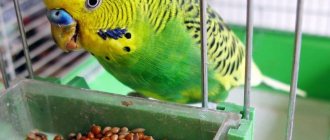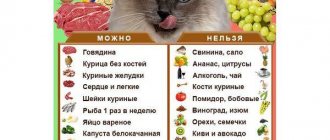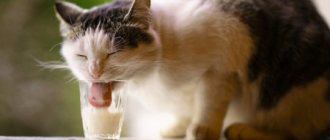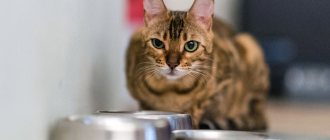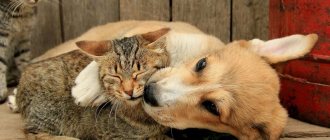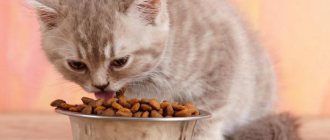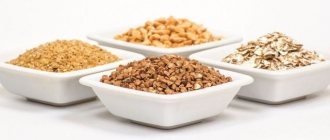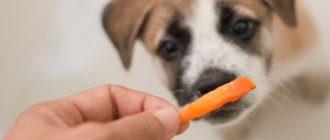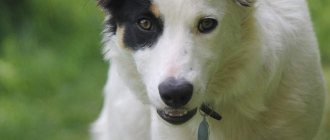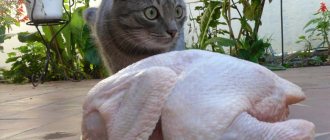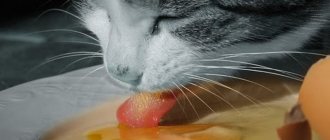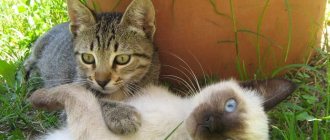Fruits and vegetables are beneficial not only for the human body; veterinary doctors also recommend giving them to cats. Plant products contain important elements for the normal growth and development of animals. However, not every vegetable and fruit is beneficial for the pet’s body, so the owner should first figure out what exactly is acceptable to include in the pet’s diet.
The benefits of fruits and vegetables for cats
High-quality industrial complementary foods of the premium and super-premium segment necessarily contain vegetable additives. This is not surprising, since plant foods include a lot of useful substances, including carbohydrates, proteins, fats, phosphorus, fiber. Despite the fact that the cat’s body is not able to digest the latter and it is excreted in its original form, its benefits cannot be overestimated.
With the help of fiber, it is possible to push the food bolus through the intestines, achieve the adsorption of harmful substances and form feces.
Fruits also contain a large number of elements required for the normal functioning of a cat. They maintain body tone and help in the prevention of various pathologies. Since they contain a large amount of water, it is possible to regulate the water balance. Plant products contain bioflavonoids, which are required to improve vascular tone and normalize the functioning of the cardiovascular system.
Doctors' recommendations
Many fluffies are not averse to eating a slice of melon.
Veterinarians recommend giving cats the amount of plant food that they ask from their owners. Seals are able to independently determine what type of feeding they need and choose from the diet offered by the owners. For example, zucchini, cucumber and pumpkin will help cope with the lack of vitamins C and A. Cats enjoy eating watermelons, melons, and carrots. It is recommended to give kittens white cabbage, parsley and dill, which contain iron, which is very beneficial for cats.
Veterinarians advise pet owners who live in apartments without access to the outdoors to grow special grass in pots. In the opposite situation, it is possible that the cat will eat all the indoor plants. However, it is important for owners not to forget that their pets’ diet should not be based on plant foods alone. You can give your pets dairy products and offal. However, such food should be fed to cats no more than once a week. It is imperative to feed cats lean meat.
How to give vegetables to a kitten?
According to veterinary nutritionists, vegetables should make up about 10% of a cat's total food intake. In some cases, for example, when fighting obesity, this figure can be increased to 30%.
Vegetables can be given either raw or cooked. As a rule, raw or processed vegetables are chopped using a blender and mixed with minced meat.
Many kittens are happy to eat raw or cooked vegetables in their pure form - there is nothing abnormal about this, it is just a matter of taste.
Whether to cook vegetables or add them raw to food - in this matter, owners should “consult” with their pets. The main thing is to observe moderation. Since rough plant food is poorly digested by cats, there is no point in trying to preserve vitamins in it, which are partially destroyed during heat treatment.
All of the above applies only to kittens whose owners feed their pets homemade food. In the case of using high-quality industrial dry or wet food, there is no need to additionally introduce vegetables into the diet.
The most useful products
What vegetables should you give your pet?
Before including plant foods in a cat’s diet, it is important for the owner to understand what kind of food will bring maximum benefit to the animal’s body. Kittens and older cats need the following natural vegetables:
Zucchini will help maintain the normal health of an elderly pet.
- Zucchini. They contain potassium, manganese and magnesium. These elements are required for the normal functioning of almost all organs and systems. The product is especially useful for older cats, since beneficial substances are removed from the body during the aging process.
- Beet. Increases the acidity of urine, which promotes the rapid removal of salts, preventing the occurrence of urolithiasis. It is recommended to give beets in small quantities, as they provoke diarrhea.
- Broccoli. Contains vitamins from group A, B and C, iron, potassium and phosphorus. Cats also love cauliflower, which is no less healthy; white cabbage will also not harm the cat.
- Carrot. Helps improve night vision.
- Cucumbers. They consist almost entirely of water, so they help normalize water balance.
- Pumpkin. Allows you to improve respiratory processes, protects the body from chemical damage, and helps strengthen bones and teeth. It is permissible for a cat to eat pumpkin only in boiled form.
- Greenery. Kittens love sorrel, parsley, and dill, which help prevent diseases of the genitourinary system.
Healthy fruits
Strawberries are very useful for fluffies, but in large quantities they lead to the development of constipation.
Some breeders note that their pet happily eats melons and watermelons. However, it is known that felines do not taste sweetness. Despite this, fruits are beneficial for the body of both a sterilized cat and a pet that may have offspring. You can feed cats the following foods:
- Apples. Contains vitamin C, which is important for the full development and growth of your pet. They are able to strengthen the immune system and protect the body from infectious and viral pathologies. It is recommended to boil the apple and turn it into puree.
- Strawberry. The composition contains a large number of useful elements, for example, folic acid, potassium and manganese. However, despite the benefits, strawberries also contain a sufficient amount of sugar, which can negatively affect the cat’s body and cause constipation.
Raw or cooked
The opinions of felinologists and veterinarians differ, but there are no strict prohibitions regarding either fresh or boiled vegetables. Cats are reluctant to eat them, so owners often follow the pet’s taste and give them in the form that he likes. Be sure to cook food for animals with diseases of the gastrointestinal tract.
The need for treatment for healthy cats depends on the stiffness of the fibers:
- beets, cabbage, and pumpkin are boiled to soften coarse fiber and reduce the concentration of nitrates;
- tomatoes, potatoes, eggplants are processed to remove solanine;
- greens and cucumbers are given raw;
- zucchini, green beans, and carrots are fed fresh and boiled.
Plant food is a secondary but necessary component of a cat’s diet. They are taught to eat them from childhood, they are given vegetables that the pet eats, except toxic ones, and they are prepared correctly.
Source
Harmful products
Avocado and eggplant
The herbal product contains persin, which has an irritating effect on the mucous membrane of the gastrointestinal tract, as a result of which the cat may experience vomiting, diarrhea, and breathing problems. Some cats prefer avocado because of its oily texture, but it is important for owners to remember that this product should absolutely not be given. Eggplant contains solanine, which can cause intestinal upset, so this vegetable is also prohibited.
Onion and garlic
When consuming such a root vegetable, the animal experiences liver dysfunction.
The first herbal product includes disulfide, which has a destructive effect on pets' red blood cells, as a result of which hemolytic anemia sometimes develops. This product is harmful in dried, powdered, boiled and raw form. Garlic contains a smaller amount of this substance, but it is also not beneficial for cats. Some pet owners are convinced that this herbal product can be given to their pets, as it is beneficial for people. However, it is important to remember that the functioning of the liver in cats and people is seriously different, so even a one-time consumption of these vegetables can cause death.
Citrus and nuts
Oranges, lemons, and grapefruits are not good for the cat's body because they provoke nausea and vomiting. Pineapples and kiwi have the same properties. You will also need to exclude peanuts, walnuts and macadamia nuts from your pet’s diet. These plant foods are rich in phosphorus, an increase in the level of which is undesirable for the cat's body.
Bananas and persimmons
The first plant product contains sugar, which is considered heavy food for pets. Enzymes that contribute to the proper absorption of such food are absent in the cat’s body, so after eating bananas the concentration of sugar in the blood increases greatly. A one-time consumption of bananas will not cause serious problems in the body, but a systematic increase in the level can cause the development of diabetes mellitus, which cannot be treated. If we talk about persimmon, then its seeds can become the cause of blockages in the intestines and inflammation of the small intestine.
Raw or cooked
The opinions of felinologists and veterinarians differ, but there are no strict prohibitions regarding either fresh or boiled vegetables. Cats are reluctant to eat them, so owners often follow the pet’s taste and give them in the form that he likes. Be sure to cook food for animals with diseases of the gastrointestinal tract.
The need for treatment for healthy cats depends on the stiffness of the fibers:
- beets, cabbage, and pumpkin are boiled to soften coarse fiber and reduce the concentration of nitrates;
- tomatoes, potatoes, eggplants are processed to remove solanine;
- greens and cucumbers are given raw;
- zucchini, green beans, and carrots are fed fresh and boiled.
Plant food is a secondary but necessary component of a cat’s diet. They are taught to eat them from childhood, they are given vegetables that the pet eats, except toxic ones, and they are prepared correctly.
